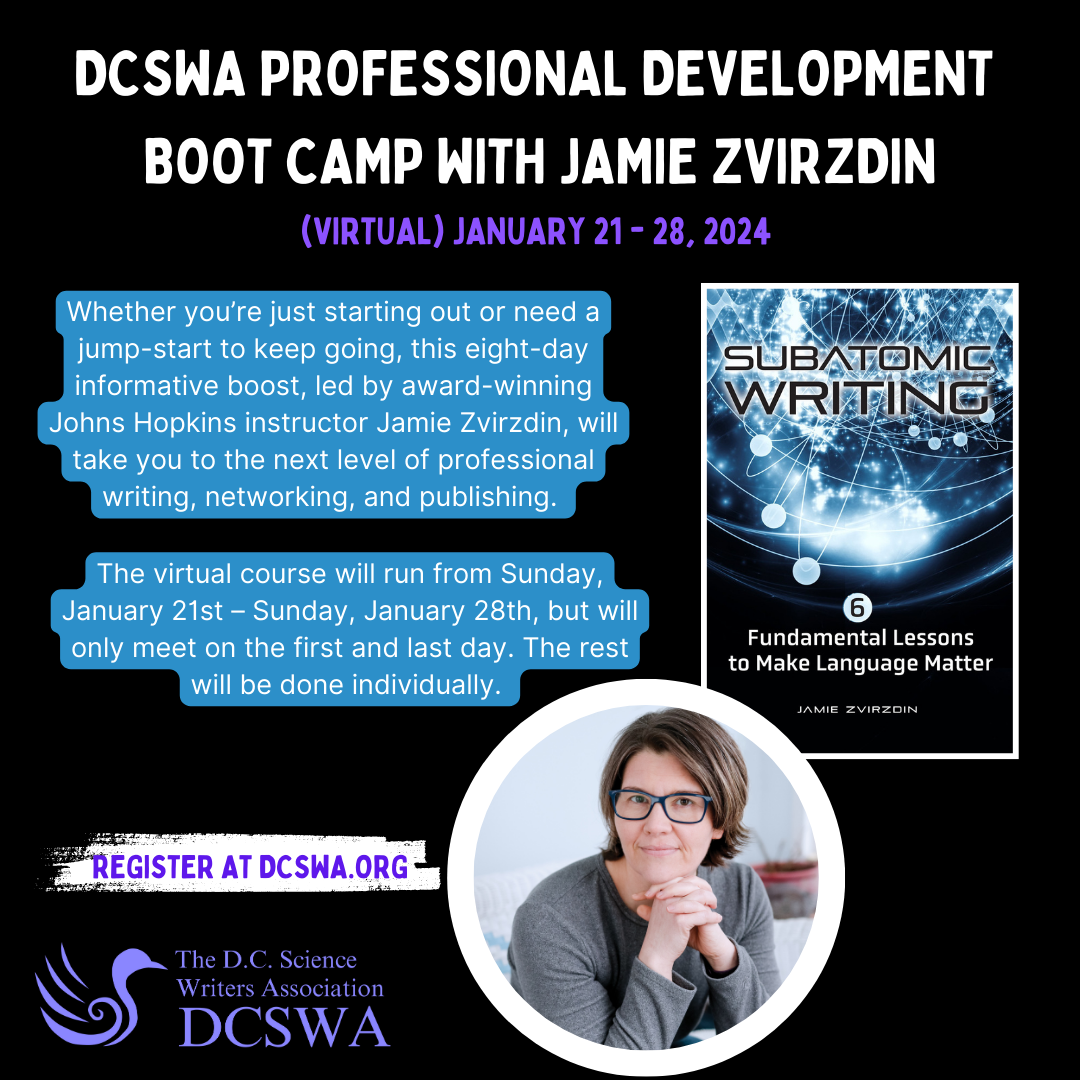
If you’re serious about science writing, do not miss this opportunity to level up your writing skills, network with other science writers, and glean industry secrets about the publishing world. Whether you’re just starting out or need a jump-start to keep going, this eight-day informative boost, led by award-winning Johns Hopkins instructor Jamie Zvirzdin, will take you to the next level of professional writing, networking, and publishing. The virtual course will run from Sunday, January 21st - Sunday, January 28th, but will only meet on the first and last day. The rest will be done individually.
Zvirzdin has been teaching the popular Subatomic Writing course for the Science Writing graduate program at JHU since 2019, and we are delighted to experience a slice of Subatomic Writing during this boot camp. The new textbook, Subatomic Writing: Six Fundamental Lessons to Make Language Matter, is now widely available from Johns Hopkins University Press and received remarkable reviews from Mary Roach, author of Fuzz and Stiff, Deborah Blum, director of the Knight Science Journalism Program at MIT and founder of Undark Magazine, Steven C. Martin, senior programmer at NASA/Goddard Space Flight Center, Christopher Joyce, NPR Science Desk Correspondent, and many other distinguished journalists and scientists.
Boot Camp Schedule
The DCSWA Professional Development Boot Camp starts at 4 p.m. ET on Sunday, January 21, with a practical Zoom workshop on identifying and improving your writing voice, plus a discussion of the best ChatGPT practices and pitfalls during the writing process. From Monday to Saturday, you’ll receive daily emails from Zvirzdin on Lessons I through VI, accompanied by manageable reading and writing assignments (skimming 20–40 pages a day, writing 100 words a day).
The boot camp concludes on Sunday, January 28, with another virtual workshop on how to write cover letters/pitches and industry secrets on how to increase your publication odds. After each workshop, you’ll have a chance to meet and develop working relationships with other science writers, with opportunities to interact during the week. This workshop is meant to be intensive but amenable to working professionals with families.
As part of the course, you are invited to obtain your own copy of the Subatomic Writing textbook to “binge-skim” during the boot camp. The textbook is based on an analogy that particles of language are like particles of matter, but no previous expertise in (or love of) physics is required, just a willingness to engage with the material and improve in all the small stuff of writing. You can find the book at your local library or purchase the book through Johns Hopkins University Press, Amazon, Barnes & Noble, Bookshop.org, or your local bookstore. There is no punishment if you do not finish (or even start) the book! However, the reward for binge-skimming Subatomic Writing is facing your own writing demons, learning how to “go subatomic” during the revision process, and deepening your mastery of moving all the particles of language around with more precision and concision.
More About Jamie Zvirzdin
Zvirzdin received the Teaching in Excellence Award in 2017 and the Distinguished Professional Achievement Award in 2023, both from JHU. Many of her former JHU students go on to publish in major outlets. Zvirzdin’s former high school student, Sophia Fratta, won the 2023 Gold Medal Writing Portfolio Award from Scholastic—one of the highest honors offered to high school students—and Sophia’s science portfolio, ROOTED, was sponsored by the New York Times.
Starting as a freelance editor, Zvirzdin edited science newspaper articles and upper-level STEM textbooks for ten years, then received an MFA in Writing & Literature from Bennington College and published science articles and essays in The Atlantic, The Kenyon Review, Issues in Science & Technology, Orion Magazine, New Republic, CONSEQUENCE Magazine, Creative Nonfiction Magazine, Brevity Magazine, and elsewhere. She also researches ultrahigh-energy cosmic rays for the Telescope Array Collaboration, which recently published a study in Science on the detection of Amaterasu, a cosmic ray whose energy rivals only the Oh-My-God particle found in 1991.
Zvirzdin also writes a monthly science column called Citizen Science for Central New York newspapers. She likes coffee, cats, and StarCraft.